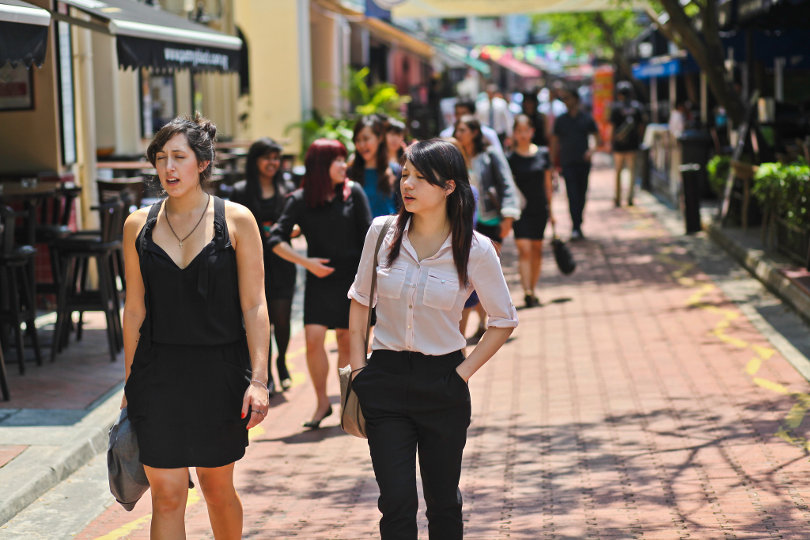There are several reasons why Singapore is an ideal location for foreign companies looking to expand their operations overseas.
First, the Singapore law allows for local corporations to be 100 percent controlled by foreigners. A parent company that forms a Singapore-incorporated subsidiary company can benefit from all the advantages of Singapore incorporation.
![]()
Competitive Tax Rates
Singapore has a flat corporate income tax rate of 17%. However, small and medium-sized enterprises (SMEs) can benefit from several tax reliefs and incentives, including If your company has fewer than 20 shareholders, you may be eligible for an annual tax deduction of up to $125K if your company earns less than $200k in taxable income during its first 3 years of operation.
In addition, if your business isn’t eligible for the startup exemption, you may qualify for a partial tax exemption. It can be up to $10,250 for the first $20,000 in revenue.
Starting a Business in Singapore
Singapore offers an excellent opportunity for businesses from across the world. They can choose to form or set up any of these types of companies:
- Subsidiary Company
- Branch Office
- Representative Office
Foreign-owned Business Assistance Programs
Singapore actively promotes local and foreign businesses by providing government-sponsored assistance programs. Depending on the requirements of each assistance program, companies with at least 30% locally owned business may qualify for local grant aid, including:
- StartUpSG is an umbrella for a variety of government-funded startup grants and loans.
- An ASP encourages companies to automate their business processes.
- Singapore offers tax breaks for foreign companies, including:
- RISC is a program to incentivize companies to develop new technologies.
- Training grant for the company, which aims to encourage the expansion of employees’ capabilities in new technology and skill.
- Efficiency grants, which create efficiency in energy and labor practice.
Restrictions for Foreigners
Singapore encourages foreigners to set up businesses here, but there are certain requirements for doing so. One of these is that the foreigner must be able to run the company locally.
Can foreigners start a business in Singapore if they hold certain work passes?
If you’re not from Singapore, you need to get a permit for your stay here. Different licenses allow different things. For example, some permits permit you to start a company, some don’t.
A foreigner who wants to open a business in Singapore must first obtain Entrepreneurial Opportunity Information from the Ministry of Trade and Industry (MTI). Once he/she has obtained the EOI, he/she can register his/her business under the Small Scale Enterprises Scheme (SSES).
If you’re convinced and ready to set up shop in Singapore as a foreigner, here are the basic things you’ll need to consider.
Obtain a license. One must register company details with the relevant authority to obtain a permit. Once registered, they may then request a license from the sources. Licenses vary depending on the industry and type of operation being conducted. For example, one would need to get a Food Establishment License (FEL) if operating within the food sector. In addition, businesses also need to comply with certain regulations such as Health & Safety Standards. These standards ensure that the safety of workers and customers is maintained.

Living in Singapore as an Entrepreneur
Expatriates living in Singapore often feel at home in a bustling metropolis where the weather is always warm. As a result, Singapore is one of the most popular destinations for expatriates from across the globe. It ranks high on the list of happiest nations for expats. And it’s not surprising why so many people choose to live there: it offers strong economic stability, good healthcare, and excellent education opportunities.
Despite the current climate of Covid-19, Singapore has seen an up trend in the number of people moving to Singapore. With the prospect of quarantine looming large, many choose to relocate to Singapore rather than face the uncertain future back home. Property prices in Singapore have risen significantly due to this influx of new residents, meaning those who have already moved to Singapore may wish to consider purchasing a property. We offer a wide range of protection policies for expatriates living in Singapore, so if you are considering buying property, there are some upcoming new launch condos for your consideration.
An upcoming new condo project called Dunman Residences is under construction along Dunman Road, District 15. The development comprises 1,040 residences of various sizes ranging from studio apartments to four-bedroom penthouses. Situated within a serene landscaped setting, residents can enjoy the beautiful views of greenery, trees, and water bodies. Within walking distance to the iconic Dakota MRT station, the development also features a wide range of lifestyle facilities, including a swimming pool, gymnasium, sauna, steam room, jogging track, children’s play areas, car park, and community clubhouse.
The official languages in Singapore include Chinese (Mandarin), Tamil, Malay, and English. These languages serve a culturally symbolic role, but English is widely spoken among the population.
Summary
Moving to a new country can be challenging, especially if you don’t know where to start. However, finding ways to get involved in the local community can help you settle in quickly and enjoy your stay.
If you want to live in Singapore permanently, you need to get proper legal residence and employment status. You might be required to apply for PR or even become a citizen of Singapore.